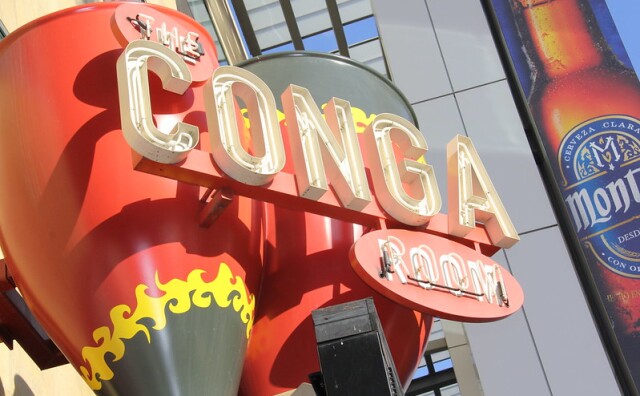Barbenheimer And The 'Complementary-Programming' Effect

If you’re hanging out in downtown Burbank this weekend, you might run into a group of friends wearing a mix of bespoke suits and bright pink ensembles.
Ian Zandi has a tradition of getting his friends to dress up and go out for his birthday. In 2021, they dressed as Ryan Gosling. In 2022, it was Tom Hanks.
This year, his birthday weekend coincides with the release of two highly anticipated summer blockbuster films — “Barbie” and “Oppenheimer.” With his 30th birthday approaching, it was go big or go home.
He sent out a Facebook invite, “We all dress up and see BARBENHEIMER double feature.” The plan: to watch both movies back-to-back dressed as either a character from Barbie’s DreamHouse, or a far grittier WWII-era Los Alamos.
Zandi’s event is open to the public, but he’s definitely not the only person planning to view the movies together. As you may know by now, “Barbenheimer” is a full-blown internet phenomenon.
-
Mogul acknowledges assault on ex-girlfriend Cassie
-
First crewed launch is delayed again
-
Mickey and the rest of the gang vote to unionize
The Barbenheimer phenomenon
“I didn’t know they were using that specific phrase,” Zandi says. “It just happened by coincidence. I planned this a few months ago, I had no idea.”
“Barbie” is a feminist telling of the story behind the Mattel Barbie doll from indie director Greta Gerwig (Lady Bird, Little Women). “Oppenheimer” is a dark, historically-grounded drama on the man behind the Manhattan Project and invention of the atomic bomb, J. Robert Oppenheimer, from director Christopher Nolan (Inception, Interstellar, Memento).
The two movies opened on July 21. This idea of two blockbuster films catered to different audiences being pitted against each other on opening weekend is not a novel concept. It actually has a name — counterprogramming.
But, despite their diametrically opposed aesthetics and themes, the hype behind the two films is deeply intertwined.
Social media is overrun with memes around Barbenheimer. Fans of Nolan v. Gerwig, the film-bros v. the girlies, and on top of it all the most important question: which one are you watching first?
Thousands of Americans have purchased their tickets to see “Barbie” and “Oppenheimer” opening weekend. AMC has reported that 40,000 of its reward members have tickets to both. After many dormant years at theaters, this weekend is headed to be one of the largest in recent history.
In L.A. — the home of Hollywood — the impact is apparent.
Tickets to see “Oppenheimer” in its intended IMAX 70mm at AMC Universal City and the TCL Chinese Theater (two of 30 theaters offering the format in the US) are sold out for the weekend, and beyond. “Barbie” is plastered on bright pink benches in the city, and there’s a real-life Barbie DreamHouse in Malibu on AirBnb.
Counterprogramming turned “complementary-programming”
Barbenheimer is the newest entry in the strategy of counterprogramming. Once relatively common, counterprogramming is when two studios release very different movies on the same weekend. The intended effect is to provide two distinct audiences a movie to see that weekend, driving up box office numbers on a whole. Stereotypically, it would look like pairing a high-octane action film with a girly romcom.
A popular example is the 2008 opening weekend of “The Dark Knight” and “Mamma Mia.” The two movies saw an epic box office battle — “The Dark Knight” won with $155.3 million, followed by “Mamma Mia” with a substantial $27.6 million.
However, over the past decade, counterprogramming has fell out of fashion. Some blame the towering popularity of superhero movies in the 2010s — particularly from Marvel — for decimating competition between other blockbusters. Additionally, with the pandemic’s blow to the theater industry, it’s no surprise that blockbusters are not often making it to movie screens on the same weekend.
But, Barbenheimer has brought counterprogramming back to theaters, at least for this summer. The two films come from competing studios — Barbie distributed by Warner Bros. and Oppenheimer by Universal. Yet, they’re a unique entry to the strategy’s cannon.
“We don't view it as a competition or counterprogramming. We view it more as complementary programming,” says Mia Lee Vicino, the West Coast Editor for Letterboxd, and a co-host of The Letterboxd Show podcast. (Letterboxd is a social media platform that hosts an online community of avid movie watchers.)
Unlike counterprogramming of the past, Barbenheimer has become a full-blown double feature. They’ve been grouped together as an inseparable viewing pair, instead of alternative film-going experiences.
On Letterboxd, “Barbie” and “Oppenheimer” are neck and neck. Ahead of the release, 240,000 users had “Oppenheimer” on their watchlist, while 290,000 included “Barbie.”
How did Barbenheimer develop this shared fanbase?
“Comedy can come from incongruence,” explains Vicino. “Barbenheimer is simply funny.”
It’s true: the internet loves contrast. Think of those two neighboring houses in Santa Monica — one colorful, and the other completely black — that make their rounds online. (Yes, they are attached to a Barbenheimer meme now too.)
Beyond the humor, Vicino also cited Nolan and Gerwig’s reputation and their star-studded casts as drivers of popularity. Both directors are Oscar winners, and early reviews have awarded “Barbie” and “Oppenheimer” with an 89 percent and 93 percent on Rotten Tomatoes, respectively.
The industry has high hopes that this weekend’s face-off might be the jump start theaters across the country need. Nolan’s last film “Tenet,” released in 2021, saw dismal performance in the box office with viewers largely opting to view it on streaming. Movie theater attendance has long been facing a decline with people opting to stay home, even before the pandemic
Family-friendly Barbie is looking to rake in $110 million opening weekend, and Oppenheimer is expected to generate $50 million.
There’s no doubt that the online phenomenon around the films is what’s drawing people to the theaters.
“I think if it is successful — and I think it will be — studios will try and replicate it,” Zandi noted. “But, you can't replicate naturally what the audience wants.”
It’s unclear whether “complimentary programming” will stick around. Memes have already started to pop up pairing the upcoming winter releases of the whimsical “Wonka” movie starring Timothee Chalamet and the historical drama “Napoleon” starring Joaquin Phoenix.
Barbenheimer is set to have a dramatic impact on the industry, and could alter culture around going to theaters for the foreseeable future.
So, put on your sparkliest outfits or classiest fedora, and head to your local theater this weekend.
-
A new trend in travel focuses on disconnecting from modern life and reconnecting with oneself in nature. It's called a "quiet vacation."
-
Samy Kamienowicz, the man who founded the retail camera stores and became a fixture for the city's creative community, has died. Los Angeles pays tribute.
-
The music will live on through the nonprofit Conga Kids.
-
Known for its elaborate light displays, this year, the neighborhood is expecting a bigger crowd tied to the release of “Candy Cane Lane” on Amazon Prime Video.
-
Dancers at Star Garden demanded better working conditions — including protection from aggressive guests. Up next: An actual contract.
-
The Alliance of Motion Picture and Television Producers rejected the SAG-AFTRA union's request for a separate type of residual payment that actors would get once their programs hit streaming services.






